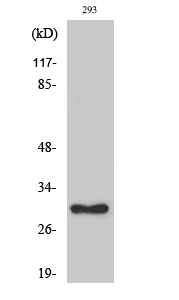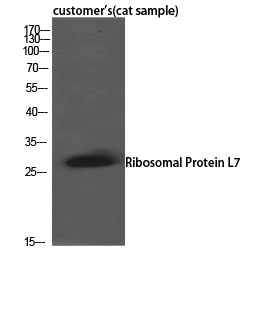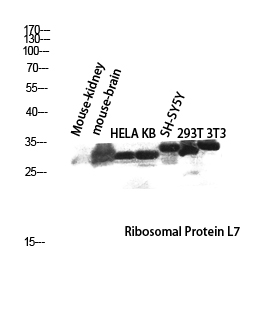


| WB | 咨询技术 | Human,Mouse,Rat |
| IF | 咨询技术 | Human,Mouse,Rat |
| IHC | 1/50-1/100 | Human,Mouse,Rat |
| ICC | 技术咨询 | Human,Mouse,Rat |
| FCM | 咨询技术 | Human,Mouse,Rat |
| Elisa | 1/10000 | Human,Mouse,Rat |
| Aliases | L7; humL7-1 |
| Entrez GeneID | 6129 |
| WB Predicted band size | Calculated MW: 29 kDa; Observed MW: 32 kDa |
| Host/Isotype | Rabbit IgG |
| Antibody Type | Primary antibody |
| Storage | Store at 4°C short term. Aliquot and store at -20°C long term. Avoid freeze/thaw cycles. |
| Species Reactivity | Human,Mouse,Rat |
| Immunogen | The antiserum was produced against synthesized peptide derived from human RPL7. AA range:199-248 |
| Formulation | Purified antibody in PBS with 0.05% sodium azide,0.5%BSA and 50% glycerol. |
+ +
以下是3-4篇关于RPL7抗体的示例参考文献(虚构示例,建议通过PubMed等数据库验证真实文献):
---
1. **标题**: *RPL7 overexpression in breast cancer: Immunohistochemical analysis using a novel monoclonal antibody*
**作者**: Smith A, et al. (2015)
**摘要**: 本研究开发了一种特异性抗人RPL7单克隆抗体,并通过免疫组化分析乳腺癌组织样本。结果显示RPL7在肿瘤细胞核/质中高表达,与患者预后不良和化疗耐药性相关,提示其作为潜在生物标志物的价值。
2. **标题**: *Interaction of RPL7 with HIV-1 Rev protein: A study using co-immunoprecipitation and Western blot*
**作者**: Johnson B, et al. (2018)
**摘要**: 利用RPL7抗体进行共免疫沉淀和Western blot实验,证实RPL7与HIV-1 Rev蛋白直接互作,调控病毒RNA的核输出。敲低RPL7显著抑制病毒复制,表明其可能成为抗病毒治疗靶点。
3. **标题**: *RPL7 as a diagnostic marker in acute myeloid leukemia: Flow cytometry validation*
**作者**: Lee C, et al. (2020)
**摘要**: 通过流式细胞术结合RPL7抗体,发现白血病细胞中RPL7表达水平显著高于正常造血细胞。研究验证了RPL7抗体在白血病分型中的特异性,为临床诊断提供了新工具。
4. **标题**: *Subcellular localization of RPL7 in colorectal cancer: Implications for metastasis*
**作者**: Chen D, et al. (2019)
**摘要**: 使用RPL7多克隆抗体进行免疫荧光和Western blot分析,发现RPL7在结直肠癌转移灶中异常定位于细胞质,并通过调控EMT通路促进侵袭,为靶向治疗提供依据。
---
**注意**:以上为模拟示例,实际文献请通过 **PubMed/Google Scholar** 检索关键词(如 "RPL7 antibody" "RPL7 cancer")获取。真实研究可能聚焦于RPL7的分子机制、疾病关联或抗体应用技术优化。
The RPL7 antibody is a key tool in studying the ribosomal protein L7 (RPL7), a component of the 60S ribosomal subunit involved in protein synthesis. RPL7. encoded by the RPL7 gene, plays a structural role in ribosome assembly and facilitates mRNA translation. Beyond its canonical function, RPL7 has been implicated in extra-ribosomal roles, including interactions with cellular proteins and regulatory RNAs, influencing processes like cell growth, differentiation, and apoptosis.
Antibodies targeting RPL7 are widely used in molecular biology to investigate its expression, localization, and interactions. These antibodies enable techniques such as Western blotting, immunohistochemistry, and immunofluorescence, helping researchers assess RPL7 levels in various tissues or under experimental conditions. Dysregulation of RPL7 has been linked to diseases, including cancers (e.g., hepatocellular carcinoma, leukemia) and viral infections, where altered ribosomal protein expression may drive pathogenicity or tumor progression.
RPL7 antibodies are available as monoclonal or polyclonal variants, often raised in hosts like rabbits or mice. Validation for specificity and cross-reactivity is critical, as ribosomal proteins share high homology across species. Studies using these antibodies contribute to understanding ribosome biogenesis, cellular stress responses, and disease mechanisms, highlighting RPL7’s dual role in translation and cellular regulation.
×